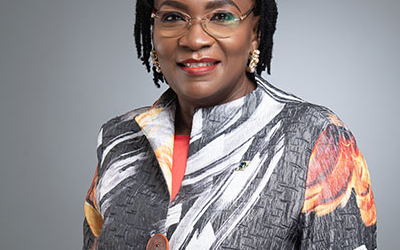The Federal Competition and Consumer Protection Act – Implications for the Nigerian Woman

Globally, there has been a growing consensus on the positive correlation between female participation in economic activities and increased growth and efficient management of resources. A recent study by McKinsey Global Institute found that $12 trillion could be added to global GDP by 2025 if female participation in the public, private and social sectors of the economy increased. Despite the increasing participation of women in politics across the world, albeit at a scale still far behind the male counterparts, these achievements of the few who have managed to break the glass ceiling has been likened to a ‘cartel’ , where only the powerful are admitted whilst the rest are shut-out from making inroad into political relevance.
The narrative rings true for Nigeria where an average of only 6.7% of women are represented in politics either through elected or appointed positions ; 22% of bank boards are female as opposed to a CBN target of 40% , and according to the World Bank, just 17.52% of 15-64 year-old women were engaged in some sort of employment in 2017. A 2013 survey by the Small and Medium Enterprises Development Agency of Nigeria (SMEDAN) showed that 23% of small or medium sized enterprises (SMEs) were owned by women and although this increased to 43% for micro enterprises (MSMEs), they are not captured as part of the economic activity as they relate to the informal sector.
Several steps have been taken globally and in the local environment to drive broad-based inclusive economic growth and close gender gap largely as a mechanism for poverty reduction and in the pursuit of shared prosperity. Development institutions such as the Bank of Agriculture, Bank of Industry have rolled out series of intervention funds targeted at enhancing access to finance for women as part of the growing effort to drive financial inclusion for all. Similarly, several regulations, even though gender-neutral, have been targeted at eliminating barriers to participation in several sectors which have traditionally impaired ability of women to compete.
One of such is the recent regulation passed by the President Muhammadu Buhari government – The Federal Competition and Consumer Protection Act (FCCP), which came into effect on February 6, 2019. The Act repeals the Consumer Protection Act Chapter 25, Laws of the Federation Nigeria 2014 and Sections 118-128 of the Investment and Securities Act which regulated Mergers and Acquisitions (M&As) via the Securities and Exchange Commission (SEC) and “establishes the Federal Competition and Consumer Protection Commission and the Competition and Consumer Protection Tribunal; for promotion of competition in the Nigerian markets at all levels, by eliminating monopolies, prohibiting abuse of a dominant market position and penalizing other restrictive trade and business practices” .
Competition and Consumer Protection Law – Historical Context
Even though anti-trust laws have been used sparingly in emerging markets including Nigeria owing to the paucity of M&A transactions and industry maturity, they have been of tremendous weaponry in developed markets including the US and European Union that have had to rein-in powerhouses with oligopolistic tendencies from decimating competition, leaving consumer with fewer choices. The much-publicized case between the European Union and Microsoft and recently, the blockage of AT&T’s acquisition of Time Warner by the US Department of Justice are some of examples of how governments and agencies have risen to protect consumers through the promotion of competition.
In the Nigerian context, it has been a long road, littered with near misses and failed attempts at passing the bill that ensures fair competition in the market place, leading to strangleholds on a number of industries by dominant players such as flour production, noodles production, cement and beverages. The first real attempt was made by the Bureau of Public Enterprise (BPE) in 2003 when the agency drafted the first competition bill for consideration by the National Assembly, followed by the competition bill drafted in 2006 by the Federal Ministry of Justice. The former bill was not considered while the latter was passed by the Federal Executive Council but rejected by the Senate owing to concerns that it did yielded too much power to future ministers of the competition agency and would result in too much political control thereby reducing the autonomy required for the law to be effectively implemented.
Following the National Assembly’s decision in 2006, a forum of BPE consultants, lawyers and practitioners came together to redraft the bill addressing the identified shortcomings of the previous version but this was again thrown out by the National Assembly. In 2008, another bill was drafted revising the previous bill and recommending the creation of a Nigerian Trade and Competition Commission. The bill passed the first and second reading at the Senate but stalled thereafter.
Despite the uproar and clamor from various stakeholders such as the Nigeria Employers’ Consultative Association (NECA), Enhancing Nigeria Advocacy for a Better Business Environment (ENABLE)+, law firms, prominent lawyers there have been no success until February 2019.
Outline of the FCCP Law
Key highlights of the new regulations are highlighted below:
On Implementation: The new law will be enforced by an independent FCCP Commission to secure the rights of all consumers and ensure safe products and efficient markets, through the creation of the FCCP Tribunal to handle any issues or disputes arising from non-compliance with the regulation. This new structure of an independent Tribunal re-directs issues regarding competition from the Federal High Court per the Nigerian Constitution, to the FCCP Tribunal. This will among others, ensure quick resolution of complaints and issues identified.
On Restrictive Agreements: Agreements such as those undertaken by trade associations which fix price, segment markets by allocation of customers, suppliers, territories etc. or limit production are strictly prohibited. Both consumers and competitors stand to gain from the implementation of this regulation which promotes a fairer playing field for businesses and prices for consumers.
On Abuse of a Dominant Position: Charging excessive prices, refusing competitor access and engaging in exclusionary acts are prohibited. A dominant position is defined as the ability to take action without consideration of the reaction of consumers or competitors, enjoying a position of economic strength and/or having dominant market share as defined by the FCCP Commission. This section of the law protects smaller businesses from being bullied by larger corporates, also protecting consumers from higher prices compared to the value they derive.
On Price Regulation: Power is given to the President to control prices in a specified industry on the recommendation of the FCCP Commission if there is concern that competition might reduce or the consumer interest could be compromised.
On Sanctions: Violation of the law for individuals will result in either a jail term up to three years or a fine of N10 million. For corporates, once convicted, will be made to pay a fine up to 10% of previous year’s turnover and each of their directors will additionally face sanctions as described for individuals. The sanctions are divergent from most Nigerian law which require the convicted to compensate victims as punitive measures. Rather under the new law, individuals and corporates face significant measures which will impact them personally and their bottom lines directly. This bolder move is a step in the right direction to ensuring compliance with the regulation across all levels.
Implications of the FCCP Law for the Nigerian woman
Aside from the obvious benefits of the FCCP for all consumers such as improved and increased choice due to a greater number of industry players offering more innovative products, there are some benefits that could arguably accrue to women more than men.
Nigerian consumers at large are at a disadvantage due to inadequate knowledge of their consumer rights. The diversity of Nigerian consumers also means that they do not face a ‘one-price-fits-all’ choice of goods and services. In some cases, such as with e-commerce, women are generally perceived as willing to pay higher compared to men which leaves them susceptible to higher pricing . The new consumer protection law could address some of these differences if adequately enforced to ensure that prices are determined by market forces rather than gender. Additionally, price fixing in the form of trade agreements or information asymmetry are also forbidden under the new law and consumers have a right to information in a plain and understandable language with proper labelling. Consumers can therefore make better-informed choices and self-select their price point based on their perceived value of a product.
The consumer protection law is also expected to improve the quality and safety of products available in the markets. In recent times, the Standards Organization of Nigeria (SON) and National Agency for Food and Drug Administration and Control (NAFDAC), have complained of the increase in fake and sub-standard products in Nigeria many of which women have fallen victim. Beauty items such as make-up and hair products and food items such as rice, margarine and cooking oil are some of the products which have been substituted with sub-standard or fake replicas and sold at market prices. While the onus has previously been on consumers to provide evidence that the products they purchase are substandard, the new law shifts this responsibility to the manufacturers to prove their products meet the expected and marketed quality. Those who fail to do so will be made liable and charged up to 10% their annual turnover in fines.
Implementing the FCCP Law
The passing of the FCCP bill into law was a major first step to securing better value for consumers through competitive markets. However, the effectiveness of the FCCP regulation is dependent on its implementation by the FCCP Commission and awareness of the law on the part of consumers. As the Commission develops its strategy for implementation of the law, and to ensure that the intended value of the law is realised, some key factors must be considered in its implementation:
• Knowledge and Competence of the Commission and Tribunal: As Nigeria’s first competition law, the FCCP is new to both its enforcers and those it intends to govern. The Commission must educate its staff on the new competition law through mandatory trainings and engagements which prepare them for effective implementation of the law.
Awareness drives such as workshops via various channels such as social media, tv networks, radios etc to educate consumers on their rights are essential to making the FCCP law effective. This is particularly important if the Commission is to gain trust of consumers in its interpretation and enforcement. A lack of understanding or inefficient interpretation of the regulation could encourage businesses to develop a perception that the Commission is ill-equipped to adequately enforce the law encouraging them to not comply. For consumers, this could be detrimental particularly for women who are at a greater disadvantage when it comes to anti-competitive behavour.
Another key concern could be the ability of the Commission to adequately police competition in Nigeria given that the former Consumer Protection Council (CPC), which will now become the Competition and Consumer Protection Commission, previously did not focus on competition. It is very rare that Competition and Consumer Protection are governed by the same body and this raises the question on whether the Commission has the required expertise to effectively manage competition in Nigeria. Furthermore, in the event that there is a conflict between consumer protection and competition, where the Commission focuses its priority could severely affect women.
The competence of the Commission and Tribunal is therefore important as the Act recommends that members among other qualifications should also have some expertise in competition law. Given that this is the first competition law in Nigeria, it is recommended that some members of the Commission and Tribunal have served in markets where competition law has effectively been implemented and functions largely as designed. This will augment the competency of both bodies in enforcing and presiding over cases related to competition.
• Prominent Gender Representation: For the FCCP to be able to influence gender equality, it is important that there is adequate representation of females to champion the cause. The government has a target of 35% females in political positions at every level, which the National Council of Women Societies has increasingly put pressure on the president to adhere to. This must also be demanded of the authorities responsible for implementation of the FCCP law. The FCCP Commission for example, currently only has 20% representation of women as directors. Although these women hold strategically important roles to the implementation of the law – Director of Surveillance and Enforcement and Director of Consumer Education – for the real issues facing women in the market place to be addressed, they need higher representation where it matters.
• Collaboration with other Agencies: The expansive mandate of the FCCP Commission will require sufficient financing and human capital to effectively implement across the country. The commission can quickly achieve scale and resources by designating authority to existing agencies such as NAFDAC, SON, SEC etc. to assist in carrying out some duties.
For sectors where regulatory commissions already exist, such as telecommunications which has become a large contributor to economic advancement and GDP, these regulatory bodies should be allowed to continue under the authority of the FCCP Commission. This will help foster a collaborative effort towards achieving more competitive markets and fair and efficient options for consumers and also present a united front to businesses when dealing with the regulatory bodies and the Commission, and limit conflict in implementing the FCCP law across all industries.
• Independence of the Commission: The Commission’s autonomy must be upheld for the FCCP law to be effectively implemented. Interference from the government or favoritism as a result of relationship or expected benefits, as can be common in Nigeria, must not be encouraged. The Commission must remain impartial in discharging its duties to ensure all businesses are fairly assessed by the law, and consumers receive fair hearing of complaints raised.
• Clarity of Jurisdiction: Pursuant to Section 251(1)(f) of the 1999 Constitution of the Federal Republic of Nigeria, the Federal High Court has jurisdiction over matters relating to monopolies. However, the new regulation appoints the FCCP Tribunal to preside over all competition-related cases, giving it equal ranking with the Federal High Court. By design, this should facilitate quicker resolution of issues. However as was seen recently the Code of Conduct Tribunal, the Federal High Court was able to interfere in the activities of the Tribunal. It is important that jurisdictional overlap is avoided so that the Tribunal can effectively carry out its duties and consumers can have access to quick and fair judgements on issues raised.
Conclusion
The challenges of implementing competition law in Nigeria are great, but the government’s willingness to pass this law, fifteen years after it was initially proposed highlights that perhaps there is a realization of the value lost in not regulating our market structures. The FCCP law could be the catalyst to creating a more conducive business environment for female entrepreneurs. Even though this law will not constitute ‘silver bullet’ in closing the gap on gender equality as the regulation does not directly address issues such as the gender wage gap and segmentation, it will go a long way in increasing access to female participation in economic activities thereby enhancing the objective of empowerment for women. Nevertheless, it remains to be seen if increased female participation translates to economic growth given the higher costs of running a business in the formal sector.
Otunba ‘Debola Osibogun
President,
Consumer Awareness and Financial Enlightenment Initiative (CAFEi)

